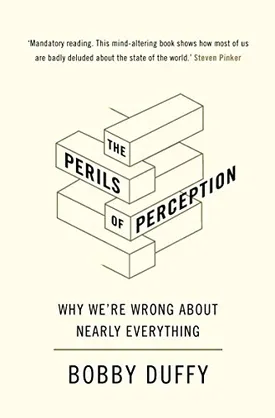The Perils of Perception: Why We’re Wrong About Nearly Everything by Bobby Duffy
Academics and authors have long examined human consciousness and the power of perception. Bobby Duffy, in his book, The Perils of Perception: Why We’re Wrong About Nearly Everything, delves into the power and danger of inaccurate public perception. Duffy, the director of the Pew Research Center’s Global Attitudes Project, studies public opinions and perceptions and this book serves as a warning and analysis of the perils that await when we rely on perception and inaccurate information.
The core argument of Duffy’s book is that public perception is generally wrong. He writes that, “we have a tendency to vastly overestimate the size and scale of certain social problems, and underestimate others.” In other words, our perceptions of how people feel about issues, how common or rare certain types of behavior and events are, and the seriousness of different dangers can be entirely misguided. Duffy argues that these perceptions lead us to direct resources towards things that may not be that important, or suffer delays and inaction concerning those in need of immediate attention.
For the basis of his argument, Duffy turns to an array of empirical research and surveys over the years. He cites significant case studies of large-scale survey results from countries all around the world that show how far public perception can be from reality. For example, surveys of public opinion in multiple countries as to what percentage of people are gay/lesbian all have inflated results (actual results are usually 1-5%, but surveys usually show answers between 10-50%).
Duffy stresses that there is more to human misperception than just guesswork. He explains the many dangers of relying on perception when in the position to make important decisions, especially those that could have lasting impacts on public safety, policy, and economy. He argues that not only do individually misguided perceptions have ill effects, but they can compound and intensify each other when a significant portion of a population feels a certain way. Further, he warns that as easy and routine as it is to make decisions based on inaccurate public assumptions, it’s difficult and oftentimes challenging to switch gears and make decisions with empirical and sourced information.
This book is for anyone eager to reexamine their perceptions and the power of public opinion, as well as the ways in which the data paints a fuller and often different picture. Duffy’s arguments are detailed and well-backed, effectively illustrating the reality of how perception can lead everyone astray. He also provides strategies on how to better gauge public opinion with more nuanced, accurate, and representative surveys.
Overall, The Perils of Perception: Why We’re Wrong About Nearly Everything by Bobby Duffy is an insightful piece of nonfiction that effectively examines the power of public opinion and how it affects decision making. Duffy puts forth an interesting and important analysis on human perception and how it can develop in regard to various public issues and collective sentiments. It serves as a warning to all its readers to be mindful of the accuracy of their information and perception before making a decision with great implications. The book is an invaluable resource for anyone interested in public opinion and the perils that can result from inaccurate perception.

